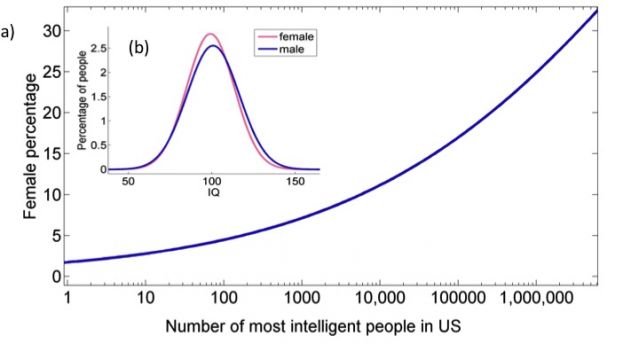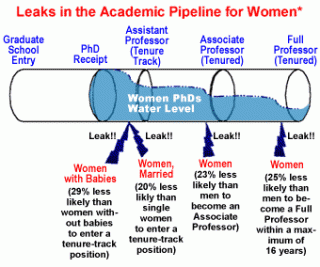Kijun Times
Kijun Times 는 교내 영어잡지,신문 동아리로 다양한 주제에 관한 이슈로 원고를 작성하며 영어 잡지를 만드는 동아리입니다.
매년 잡지 출판뿐만 아니라 자신의 진로와 관련된 개인기사, 모둠기사를 작성함으로써 영어 실력향상은 물론 주제에 제한이 없기 때문에 다양한 진로에 접목 가능합니다.
We are looking for a new journalist for The KIJUN TIMES.
Anyone can be a journalist for The KIJUN TIMES.

Women in Science: What Explains Gaps? Part I |
|||||
|---|---|---|---|---|---|
| 이름 | 김유진 | 등록일 | 15.11.18 | 조회수 | 303 |
|
This is a guest post by Dr. Stephanie Meyer, offered in response to my call for women willing to write guest posts that contest the “narratives of oppression and victimization” that dominate social psychology and the social sciences. She earned her Ph.D. from the Department of Physics at CU Boulder in 2011 and is currently a research associate at the University of Colorado Denver. She blogs at notthatgungho.com. Everything below is her's, except for the pictures. This blog entry is first of a two-entry sequence. ---------------------------------------------------------------------------------- I earned my PhD in physics in 2011, after starting my PhD program as one of four females in a class of more than 50 incoming students; therefore the dearth of women in physics is quite a salient issue for me. I want people who have a passion for physics to have the opportunity to succeed, regardless of their gender, race or socio-economics. Family-friendly practices are the key to making this happen for females, not blindly pro-female hiring practices. I don't want a job because I have the right genitalia in the name of "diversity,” I want a job because I'm the best applicant and a good addition to the department. How am I supposed to build confidence if I never know whether I earned my success [1]? Women scientists already suffer from imposter syndrome: practices that make us think we may be given unearned advantage aren’t helpful. What is the point of living? From a biological viewpoint, it is passing on one’s genes. However, many intelligent members of my species seem to have forgotten that point when it comes to gender issues in the sciences. Fetuses start out female and become male through the “organizational principle”, through the action of hormones in utero. These same hormones act on our brains and lead to behavior that is more feminine or masculine, though of course, because we are talking about populations, there is a large range of behavior for both genders, much overlap and no hard and fast rules [2]. Gender isn’t JUST a sociological construct, though culture plays a large role as well. Humans are part of a complex system that includes evolution selecting for four modes of inheritance: genes, epigenetics, behavioral culture and symbolic culture. Traits are the result of interactions during development between the modes of inheritance, and that is why all traits are a combination of nature and nurture [3]. If we want more women with potential to succeed in the sciences, we need to acknowledge that human females are evolved to be mothers; otherwise none of us would be here to have this conversation. There may never be gender parity between the number of males and females in physics and that doesn’t bother me, as long as those who have the ability, desire, and drive to succeed can have the opportunity. Already, the women who are excellent physicists often cluster into fields that have more humanitarian applications, such as biophysics, my own field, likely due to the “things-people” dichotomy mentioned in [4]. Additionally, my colleague Pascal Del’Haye used IQ data and came to a similar conclusion as Larry Summer’s in his infamous speech at Harvard [5]. On average, women are generally as smart as men but cluster closer to the mean. Thus, men tend to be overrepresented in the higher and lower IQ results, as shown in the figure. This fact may be a part of the reason why there are more male physicists, in addition to social explanations. The means are nearly identical, there are just more men further from the mean in both directions. This may be why fields that require mathematical ability several standard deviations above the mean tend to have fewer women in them [6]. A possible explanation for higher variations among cognitive traits in men compared to women is based on the mosaicism in female brains due to x-chromosome inactivation, which could be causing an averaging in x-chromosome based effects in female brains as compared to male brains [7].  Source: Stephanie Meyer Figure: IQ distributions by gender. The inset (b) shows a broader IQ distribution for men compared to women. This means there are more men with high IQ and more men with low IQ. The graph in panel (a) shows that this difference in IQ distributions leads to a lower percentage of women when looking at groups of people with high IQ. (IQ distribution data from [8], analysis and figure made by Dr. Pascal Del’Haye). The possibility that men and women may not have, on average, exactly the same interest and ability in physics, or any other field, does not mean that people who do have the talents in those fields can’t and shouldn't pursue their dreams and contribute to their fields. There’s no reason to deny or run from reality, including that there are some male and female differences; instead we can focus on providing young girls who show promise with role models and support systems, if we value having them continue into the sciences, as suggested in [4]. Scientists from atypical groups may be of higher quality because they have to be motivated and skilled to have the confidence and drive to go for a field that they have been told they shouldn't be good at. I defined myself by working hard to succeed when I was told "physics is really hard, are you sure you're smart enough for that?" Yes I am, and I proved it with hard work and determination. I know how it feels to be female in a male-dominated field. I felt oppressed as a graduate student in physics, where people are routinely treated like things in the name of "science,” often to fuel the narcissistic egos of certain professors. That is wrong, regardless of whether the person is male or female on the giving or receiving end. I know it's tempting to blame "the patriarchy”. There are still some older men in physics who don’t think women should be there, but there are always bigots in any group. We should stop labeling and grouping and setting up battle lines and start thinking about what is good for science and scientists.  Source: UC Family Friendly Page Taking away a woman’s chances of experiencing the maternal bond is harmful, not helpful. I think we need to acknowledge, as a society, that ambitious, intelligent women can and SHOULD contribute to society through their families and/or their careers, and that making that choice an either/or proposition harms women, men, children, and the future of our gene pool. So instead of getting upset with women for choosing career paths compatible with their vision of being a mother, let’s acknowledge the differences between men and women so that women can think through their choices clearly when it comes to their biological imperatives. If you want to attract women to academic science careers, they must be able to see them as compatible with motherhood. As a physicist, this isn’t my area of expertise, but from what I’ve read, human females, more so than most other species, are evolutionary formed for motherhood. Our babies are born early due to the competition between the evolution of larger brains, which meant giving birth to babies with big heads, while at the same time we started walking upright and thus our hips became narrower [9]. Hence humans have what is referred to as the “fourth trimester,” the first few months of a baby’s life in which it should still be in the womb but cannot stay there and come out alive often enough to warrant that extra incubation time. This fact combined with a much longer childhood, which allows social and behavioral learning to happen, means human females are truly made to be mothers, whether or not we ever act on this, though ideally there would also be a village of support that included their partners. One important result is that humans have specific brain circuitry to form attachments to our babies that are incredibly important to our species. In mothers this is enhanced through infancy from the hormonal effects of nursing on the baby and mother. When this attachment goes awry, it can lead to behavioral and social problems in our offspring that are much harder to fix later in life; successful outcomes in life are much more likely when a secure attachment is formed early [10]. It is incredibly important to the future of humanity to encourage mothers (and fathers) to form secure attachments. Females also have monthly cycles that cause serious ups and downs in our emotions. Our bodies and brains are evolved to make us want to make babies when our bodies are most fertile and these cycles affect our moods [2]. The first rule of biological beings is to stay alive; the second rule is to make babies, duh! It doesn’t take a Ph.D. in Evolutionary Biology to know this and make the connection. |
|||||
| 이전글 | The Vicious Circle of Ignorance |
|---|---|
| 다음글 | Here's How to Finally Love Math With Your Child |